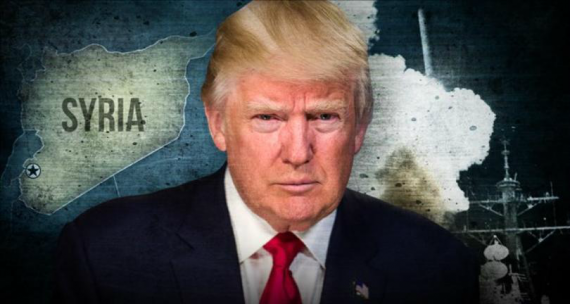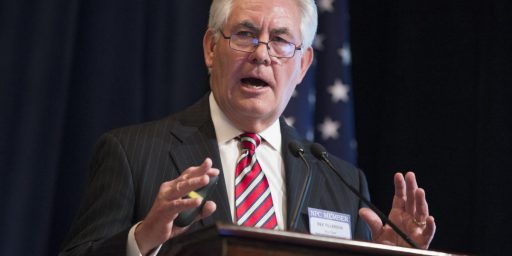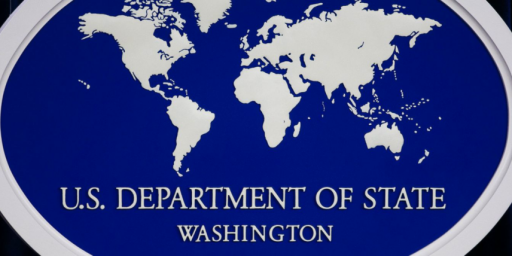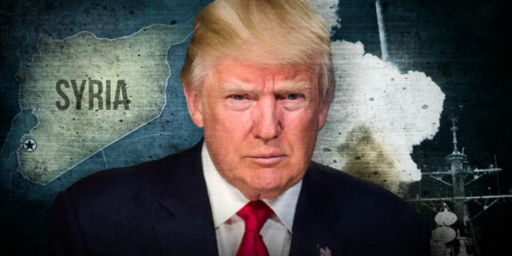Trump Preparing For A Forever War In Syria
While everyone is paying attention to the government shutdown, the Trump Administration is preparing for a never-ending, unwise, and unauthorized military commitment in Syria.
Secretary of State Rex Tillerson is saying that American troops are likely to remain in Syria even after ISIS is defeated:
WASHINGTON — American troops will remain in Syria long after their fight against the Islamic State to ensure that neither Iran nor President Bashar al-Assad of Syria take over areas that have been newly liberated with help from the United States, Secretary of State Rex W. Tillerson said on Wednesday.
Staying in Syria, Mr. Tillerson said, will help ensure that the Trump administration does not repeat what he described as the mistakes of former President Barack Obama, who withdrew troops from Iraq before the extremist threat was doused and failed to stabilize Libya after NATO airstrikes that led to the overthrow of Col. Muammar el-Qaddafi.
“We cannot allow history to repeat itself in Syria,” Mr. Tillerson said during a speech at the Hoover Institution at Stanford University near San Francisco. “ISIS has one foot in the grave, and by maintaining an American military presence in Syria until the full and complete defeat of ISIS is achieved, it will soon have two.”
ISIS is another name for the Islamic State.
There were roughly 2,000 American troops in Syria last month, a mix of engineering units that build fortifications and Special Operations units that fight and train with local militias. Additionally, American military contractors in Syria help demine recaptured areas as the Islamic State is pushed back.
Mr. Tillerson’s comments were the first time a senior Trump administration official pledged to keep American troops in Syria well after the current battle ends. They also marked another step in President Trump’s gradual evolution from a populist firebrand who promised to extricate the United States from foreign military entanglements to one who is grudgingly accepting many of the national security strategies he once derided.
During the presidential campaign, Mr. Trump said that “at some point, we cannot be the policeman of the world.”
Mr. Obama won the White House in 2008 in part by promising to wind down the war in Iraq, and agreed to only a limited role in the 2011 airstrikes in Libya. Those decisions have haunted the military officers who now serve in Mr. Trump’s cabinet and, in turn, have led to the administration’s deepening military involvement in Afghanistan.
Mr. Trump has said American forces must remain in Afghanistan because “a hasty withdrawal would create a vacuum for terrorists, including ISIS and Al Qaeda.” Mr. Tillerson repeated that rationale in outlining the administration’s decision to keep forces in Syria.
He did not say whether other countries would help pay for the American military effort or other stabilization costs, even though Mr. Trump also promised during the presidential campaign that he would compel Germany and Persian Gulf nations to contribute financing “because they have the money.”
Mr. Tillerson said the military commitment to Syria was “conditions-based” and not indefinite. But he underscored that it would take time to foster a democratically elected government in Syria that he — like the Obama administration — said would require Mr. Assad’s departure from power.
“He did not say whether other countries would help pay for the American military effort or other stabilization costs, even though Mr. Trump also promised during the presidential campaign that he would compel Germany and Persian Gulf nations to contribute financing “because they have the money.”
(…)
Analysts raised concerns that there might never come a time when withdrawal would be deemed appropriate.
“Yes, we can leave troops there for the foreseeable future,” said Gina Abercrombie-Winstanley, a former ambassador and career diplomat. “But is that 20 years, the way Afghanistan soon will be?”
The United States has five key goals in Syria, Mr. Tillerson said. They are: ensuring that the Islamic State and Al Qaeda never re-emerge; supporting the United Nations-led political process; diminishing Iran’s influence; making sure the country is free of weapons of mass destruction; and helping refugees to return after years of civil war.
Mr. Tillerson conceded the steep challenge in fostering peace and democracy in Syria, where efforts by world leaders and diplomats across the Middle East and the West have fallen short.
He is working on a reorganization of the State Department, which so far has resulted in steep budget cuts and the departure of some of its most senior diplomats, including some top Middle East experts. Such expertise is vital to any military or diplomatic ventures in the Middle East, where contradictory and crosscutting rivalries are endemic.
For instance, American backing for a Kurdish-led border force in northeastern Syria has raised alarms in the region and is vehemently opposed by Russia, Turkey, Iran and Mr. Assad’s government. The border force has been described as a “terror army” by President Recep Tayyip Erdogan of Turkey, who worries it will be operated by a Kurdish militia that he considers a threat to his country.
On Wednesday, Deputy Prime Minister Bekir Bozdag of Turkey said his country had reached the limit of its patience regarding developments along its borders. Mr. Tillerson sought to allay the concerns, saying that “any interim arrangements must be truly representative and must not threaten any neighboring states.”
As noted above, this position, which appears to have the support of the White House, the Defense Department, and the rest of President Trump’s foreign policy team, is a marked difference from the rhetoric we heard from President Trump during the campaign for President. During that time, he was virtually alone in being a harsh critic, albeit in retrospect, of the War in Iraq and suggested that he would pursue a less aggressive foreign policy than either President George W. Bush or President Obama. He was also critical of several of America’s allies in Europe, as well as the Japanese and South Koreans, for not contributing more to their own defense. Indeed, at times he was criticized by many of his Republican of sounding like an isolationist even though he was simultaneously talking about significantly expanding the war against ISIS and even openly speculating at the time about applying more pressure to North Korea regarding their nuclear weapons and ballistic missile programs. Once he became President, Trump seemed to cast doubt on his own commitment to things such as his commitment to the collective defense provisions of the NATO Treaty and several of America’s closest allies in Europe reacted by openly talking about having to take on more responsibility themselves because they weren’t sure they could count on the United States to stand by them in the face of something such as increased provocation by Russian President Vladimir Putin.
Since becoming President, of course, Trump has largely abandoned nearly off of that less aggressive rhetoric and pursued policies not all that different from those of his predecessors. He has continued, and to some extent accelerated, the strategy put in place by former President Obama with regard to the fight against ISIS. That strategy has admittedly shown no small degree of success over the past year with developments such as a fall ISIS strongholds such as Mosul in Iraq and the capital of its self-proclaimed Caliphate in Raqqa, Syria. He has pursued a policy of harsh and threatening rhetoric against the regime of Kim Jong Un in North Korea and engaged in what amounts to an international game of name-calling with the North Korean leader that seems to have done little except escalating tensions on the already tense Korean peninsula. In addition, he has expanded the already never-ending war in Afghanistan, which began its seventeenth year in October and shows no sign of ending anytime soon. Now, the Trump Administration is effectively proposing to turn a presence in Syria that was supposed to be limited to the fight against ISIS into a long-term commitment in a country that has been caught up in chaos and civil war for the past six years, a conflict that also shows no sign of ending in which the principal forces fighting against the central government consist of heavily armed radical jihadists not that are effectively not dissimilar from ISIS and al Qaeda itself. The result of all this, inevitably, is that Syria has become another breeding ground for terrorists that has resulted in terrorist attacks in Europe and the United States and has also inspired jihadist groups in Africa, which is quickly becoming a brand new front in the so-called “War On Terror.”
There is one significant difference between the War in Afghanistan and the apparently new policy in Syria, of course. For better or worse, American involvement in Afghanistan was at least ratified by Congress by virtue of the Authorization For Use Of Military Force that was passed by Congress roughly a month after the September 11th attacks. While there are several good arguments in favor of the idea that it is long past time for Congress to consider whether that AUMF should be reviewed and whether Congress intended to be as open-ended as Presidents Bush, Obama, and Trump have interpreted it to be, one can at least say that the idea to get involved in that country was at least considered and debated by Congress as required by the Constitution. The same is not true with regard to the current American presence in Syria. In what was to say the least a very generous legal interpretation, the Obama Administration argued that it was authorized to pursue the fight against ISIS by virtue of the AUMF that authorized the Afghan War aimed at al Qaeda and the AUMF that authorized the Iraq War. Even if you accept that argument, though, there is simply no way to interpret either document to authorize a continued military presence in Syria that is separate an apart from the fight against ISIS. Given that, it seems clear that such a presence would be illegal and unconstitutional absent Congressional authorization. Nothing will come of this argument, of course, because Congress will do nothing to challenge the Administration’s actions. Notwithstanding that, though, it would be nice if someone raised the argument and at least pretended that the Constitution still mattered.







In a part of the world where there are no good solutions, we seem intent on trying to demonstrate that we have tried every bad one. I will grant that this is different bad solution than Lybia, so at least there is that, and the existence of a Russian backed government makes it different from Afghanistan. It will at least be a different mistake. So, yey?
I’m not a fan of Assad, but I don’t think we should be involved in overthrowing him, and if that’s not the intent here I really don’t understand it. Are we going to be protecting these areas if Assad bombs? What if insurgents opposed to Assad are hiding there? And what about anti-American insurgents? And are we expecting a democracy to pop up there?
And then there are the Russians providing military support to Assad.
I would rather we trying to find a nice retirement for Assad, with firm guarantees of not sending him to The Hague. Replace him with a less worse dictator and walk away. Have we tried?
And yes, we should have congress approving this. I half expect the AUMF to be used to justify domestic actions soon.
@Gustopher:
I’m with you. We’ll spend trillions to blow up these, as the prez would say, shithole countries. But we won’t consider thinking outside the box and maybe spending a hundred million to buy our way out.
Went to “The Post” last night. As they read the Pentagon Papers it dawns on everybody that we are in Vietnam because Truman, Eisenhower, Kennedy, Johnson, and Nixon unanimously agreed that they didn’t want to be the President who paid the political price for getting out.
On the other hand, we’re pretty much done in Iraq and W seems to have established a norm of being in two perpetual wars.
Bibi Netanyahu will be pleased, which is presumably the point. Trump’s supporters are largely white evangelical Christians and they’ll be thrilled at the idea of us keeping a ringside seat at the Jew-killing armageddon that is so essential to their unhinged worldview. Bibi gets us as a defensive force to his north-east and Evangelicals get to indulge their genocidal fantasies.
As for sane people, this looks like Lebanon 1983. We will have a weak force in a very bad place. A weak force with no mission other than to allow Trump to avoid taking responsibility for getting out. Task Force Target. There is no upside, this is all down-side risk, the act of a stupid, reckless and cowardly bunch of men, plus the idiot toddler they serve.
He still believes this; it’s just that the implementation date has been set back to 2025.
@Gustopher: “And are we expecting a democracy to pop up there?”
Yes, that would seem to be the case.
@michael reynolds: Evangelicals get to send other people’s children to indulge their genocidal fantasies.
FTFY. No charge.
@michael reynolds:
Clinton was even more Hawkish on Syria than Trump was during the campaign, so I’m not sure why you think this comes down to Evangelical voters. This is more a problem of Americans in general refusing to accept we can’t solve all of the world’s problems.
@Stormy Dragon:
Clinton?
@Stormy Dragon:
1) The core of Trump’s support is Evangelicals.
2) Trump ran on reducing American overseas involvement, not on deepening it.
3) As usual, he changed his position without, of course, quite understanding what he was doing.
So, what caused Trump’s change of heart? My reasonable suspicion: Israeli hardliners and Evangelicals. Either that or Steve Doocey.
Shorter: Occupation Troops
The region will be soooo pleased.
Trump needs to explain clearly what the goals are,
what the exit strategy is, and what could happen if we just stay out. As usual, there are legitimate views all the way around. And this could be another no end pitfall. It seems our leaders ignore a lot of past history with these kind of involvements. Congress needs to get in on the act on every step.
The damage done to ancient cities such as beautiful and historic Damascus has been a tragedy.
Damascus – the city of General Allenby and Colonel Lawrence.
I think that the serious Constitutional questions of Presidential control over the armed forces versus Congressional mandates to ‘raise an army & navy’ and ‘to declare war’ desire a complete airing out. Especially concerning nukes.
But it would seem President Edogan wants to get to the core of the question. After a day of aerial bombardment he has invaded the Kurdish enclave that we helped them carve out against ISIS.
I am so tired of winning.
@Tyrell: As always, I love your posts here, Tyrell. Your little postscript about Allenby and Lawrence sort of short-circuited with MichaelR’s post above about evangelical eschatological thinking and well….
Didja know that Allenby and Lawrence fought and won the battle of Armageddon? It’s true. Sept of ’18. One century ago, give or take. There’s got to be something meaningful about that, eh?
@Tyrell: You think Trump has goals. That so cute! Bless your little heart!
@JohnMcC:
Unfortunately, Congress seems quiet happy to let the President usurp their warmaking powers. That way they never have to pin down their views with a vote. That way when things go bad they can tell everyone how they’d have done something different that would have magically worked.
@Stormy Dragon: Exactly. Congress has the power to supervise the Fed, but the last thing in the world they’d do is take on any responsibility for the economy. Better to just do a show trial hearing now and again but otherwise leave it alone.
@Stormy Dragon: Check that, my friend. Personally, I’m still bitter about the frigging Gulf of Tonkin Resolution. This debate used to be generally called ‘the Imperial Presidency: Good or Bad’ but it seems we’ve found peace with the idea that we’re an empire.
@Tyrell: “Damascus – the city of General Allenby and Colonel Lawrence.”
Oh, Tyrrell, how well you restate the core of the problem without coming close to realizing it.
The people who live in Damascus can date their city back to the 11th century BC — to the transition from the bronze age to the iron age. They know that Greeks, Romans and Turks have taken the city as part of their empires, and lost it as those empires collapsed. They can trace their culture back so far their hometown is mentioned in Genesis.
To you, it belongs to two white Englishmen who stopped by for a bit at the beginning of last century. Can you see that there might be a disconnect here?
@wr: “The best of them won’t come for money, they’ll come for me”.
Colonel Lawrence “Lawrence of Arabia” 1962, Columbia Pictures